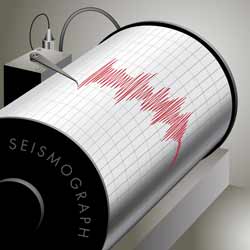Seismologist Careers
The power of nature is an amazing thing. If you’ve ever felt the Earth shake underneath your feet, you’ve probably experienced a geologic phenomenon called an earthquake. It’s a sensation that you’ll never forget.
Earthquakes don’t make the news very often, but they happen frequently. Did you know that thousands of earthquakes happen every year? As the Earth’s tectonic plates collide they release energy in the form seismic waves. Those waves ripple through the Earth’s core, resulting in earthquakes, tsunamis, landslides, volcanoes, and other geological events.

A seismologist is a scientist who studies why and how seismic waves propagate through different geological materials and what results occur because of it. It’s a fascinating scientific field that employs people all over the world.
Seismologists monitor how the Earth moves. They constantly watch seismographs, map earthquakes, visit quake sites, evaluate dangers and hazards, measure magnitude on the Richter scale, assess an earthquake’s earth-shattering damage potential, and conduct research. Based on their findings, they forecast for earthquakes, assess seismic risk, assist in building engineering, work as university professors, and publish their results in scientific journals.
But seismologists do other things too. The study of seismic waves has other applications beyond studying and forecasting for natural tectonic shifts. Seismologists often use their knowledge of seismic waves for other, more lucrative tasks.
Seismology is used to detect nuclear explosions. When a nuclear device explodes, it transmits seismic waves through the Earth’s surface. Seismologists actively monitor for unusual seismic activity around the globe to see if countries are violating nuclear test bans. To learn more about this, they may get to play around with large, controlled, explosives in the name of science.
Seismologists also determine the structure of the Earth for the mining or oil and gas industries. By monitoring how seismic waves travel through different geological materials, seismologists can determine what’s beneath the surface. Mining companies want to know what types of rocks they may have to dig through, while oil and gas companies pay big bucks for seismologists to determine the location of new oil and gas fields deep below the Earth’s surface.
To become a seismologist, you need to have a university level degree. There are entry level jobs available for people who have a Bachelor’s degree in geology, math, or physics. If you want to do fieldwork, you need a Master’s degree in geophysics, geology, or engineering. If you want to do seismic research or find a university position, you’ll need a Doctorate degree.
Seismologists can find work with universities, laboratories, observatories, research firms, environmental consulting firms, oil and gas companies, governments, insurance companies, or engineering companies. In the US, the majority of jobs are located in the West. Approximately 25% of all seismology jobs are in the oil and gas industry in oil rich states like Texas and North Dakota.
Seismologists earn between $30,000 and $125,000 per year. The average salary of a seismologist is $57,000. Pay varies based on factors like location, experience, employer, skill set, and other variables. For example, a seismologist searching for oil will earn a higher salary than a seismologist doing research for a university.
Whether you’re forecasting earthquakes, monitoring for nuclear activity, or determining the geological structure of the Earth for big companies, being a seismologist is a pretty exciting job. It’s a growing niche and there are definitely cool job opportunities for aspiring seismologists. Are you ready to find a seismologist job?
Quick Facts About Seismologist Jobs
Job Title: Seismologist
Office: Laboratories and in the field
Description: Study seismic waves and earthquakes
Certifications/Education: Master’s degree in Geophysics
Necessary Skills: Research, Exploration, Science focused
Potential Employers: Governments, Universities, Oil and Gas Companies
Pay: $30,000 and $125,000 per year


 Teach English in Asia
Teach English in Asia  Cruise Ship Jobs
Cruise Ship Jobs  Alaska Fishing Industry Jobs
Alaska Fishing Industry Jobs  Sharing Economy / Gig Economy
Sharing Economy / Gig Economy